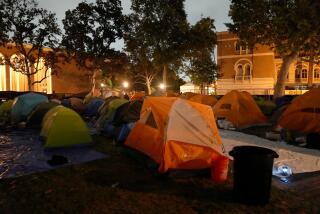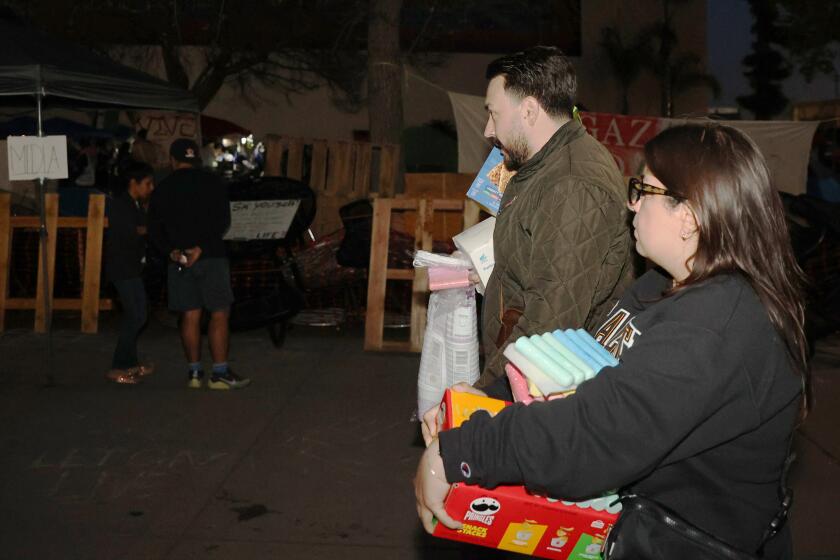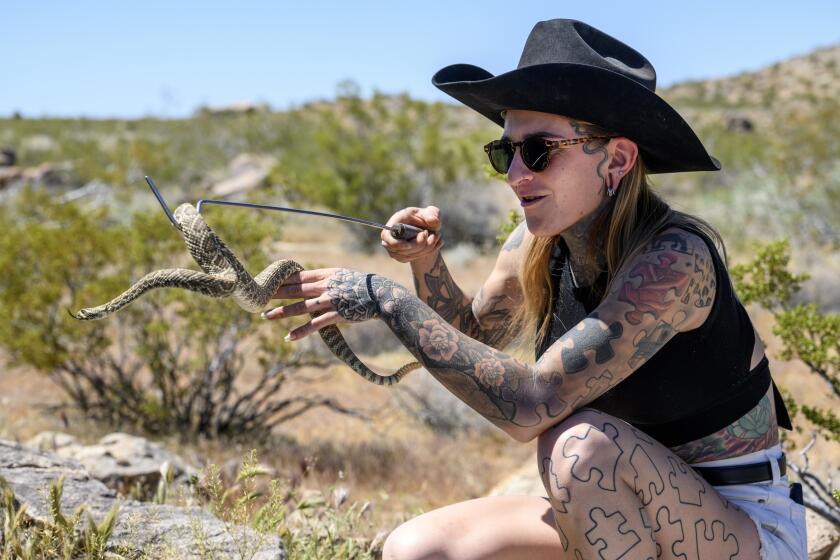Pellicano calls one witness
Hollywood private eye Anthony Pellicano rested his case Friday in federal court after calling just a single witness to rebut charges that he conducted a years-long, illegal wiretapping and racketeering operation on behalf of his wealthy clients.
Pellicano, who represented himself in court, made for an awkward defense attorney and repeatedly begged his only witness -- a subdued FBI computer forensic expert -- to speak up on the stand. The questioning lasted about an hour.
Pellicano chose not to take the witness stand himself -- although he has told U.S. District Judge Dale S. Fischer that he reserves the right to testify at the end of the trial. In contrast, his co-defendant, Mark Arneson, a former Los Angeles Police Department sergeant, spent most of the day testifying passionately in his defense. He is charged with making numerous unauthorized searches of confidential LAPD databases.
“Yes, I did cross the line,” he testified, admitting he made the checks. But it was all part of his “complex relationship” with Pellicano, who provided police with beneficial information, he said.
Arneson said that while he furnished Pellicano with confidential information, the private detective provided the sergeant and vice officer with “guidance,” particularly about organized crime suspects. “He wanted me to watch my back; he wanted me to know what I was dealing with if I was going to go after these people,” Arneson said.
Pellicano, 64, started the morning with his wife, Kat, and his two daughters, Josi, 17, and Tori, 18, in the courtroom watching him. (“I think he did excellent,” Kat Pellicano said.)
Wearing a dark green, jail-issue jacket, Pellicano questioned FBI computer forensics expert Donald Schmidt about the computers and audiotapes the FBI seized from the private eye’s Sunset Boulevard office in 2002. Pellicano pressed Schmidt on how he knew he had found audiotapes that might be from wiretaps.
“I found what sounded like telephone recordings,” Schmidt said.
“OK. What is a wiretap?” Pellicano asked.
“My understanding is it’s a recording of a phone call,” Schmidt answered.
After Pellicano rested his case, Arneson’s attorney Chad Hummel led his client through the story of his life -- growing up in Playa del Rey, shifting his career aspirations from writer to cop -- and the genesis of his involvement with Pellicano.
Arneson, 54, said he met Pellicano in 1986 when he was working homicide in the 77th Street Division. Arneson took Pellicano an audiotape related to a case that the private eye was working on as an expert analyst. By the mid-1990s, Arneson had started a security consulting business, Mark Enterprises -- outside work sanctioned by the LAPD, he said.
Pellicano hired him, Arneson said, eventually putting him on a $2,500 monthly retainer and a pager.
For the fees, he said, he provided bodyguard services, surveillance and “residence security assessment.” Arneson testified that he or off-duty officers he employed were called on to guard Farrah Fawcett, Mary J. Blige, Enya, Vidal Sassoon and Whoopi Goldberg, among others.
“Whoopi Goldberg was wearing approximately $36 million in jewelry at one of the Oscar telecasts,” Arneson testified. While another security guard watched the gems, Arneson concentrated on the star.
At Pellicano’s request, Arneson said, he assessed security at a home for Nicolas Cage. He also assigned two employees to provide round-the-clock security for attorney Bert Fields’ Beverly Hills home while it was being fumigated.
Fields, who often hired Pellicano and whose name has regularly popped up in testimony, is expected to be called by Hummel to testify next week.
Arneson said he was paid a total of $195,000 from 1997 to 2002 and used that money to pay himself and the officers he hired.
Although he was paged at all hours to do unauthorized computer checks, he insisted that the money was never for that service. “I could never be paid for running names or anything through the LAPD computer base,” he said.
Arneson downplayed the significance of the information he provided, saying that Pellicano often already had the names, dates of birth and driver’s license numbers. “I was affirming what he already knew,” Arneson testified. “I was eliminating his leg work.”
Arneson -- who faces racketeering charges -- said that he did not know what Pellicano was doing with the information he provided and that he didn’t know who the private eye’s clients were.
Arneson said Pellicano gave him information that helped him locate suspects and interrogate them.
“I thought this was for the greater good,” Arneson said. “I thought it was helping the police.”
But Assistant U.S. Atty. Daniel Saunders made it immediately clear that he was buying none of this. Noting Arneson’s testimony that the searches were to confirm information the detective already had or could get himself, Saunders said, “So you spent hours doing computer runs for no reason at all?”
When Arneson estimated that he had done 100 computer runs over seven years for Pellicano, Saunders said the Police Department’s audit of Arneson’s inquiries found that he had probably done more than 100 on individual days.
“Didn’t you do thousands of runs?” Saunders demanded during a withering cross-examination.
“I have no idea,” Arneson said.
“Did you ever tell any of your squad that defendant Pellicano was this source of all this great information?” Saunders asked.
“No,” Arneson responded. “Nor would I.”
--
More to Read
Start your day right
Sign up for Essential California for news, features and recommendations from the L.A. Times and beyond in your inbox six days a week.
You may occasionally receive promotional content from the Los Angeles Times.







